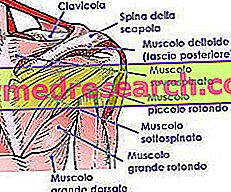
Information on R-ALA - Allmax Nutrition - alpha-lipoic acid
R-ALA - ALLMAX NUTRITION
Food supplement based on alpha-lipoic acid.
FORMAT
60 cps bottle
COMPOSITION
Alpha Lipoic Acid
Anti-caking agent: magnesium stearate
Capsule: edible gelatin
One capsule contains: Acid R Alpha Lipoic Acid 125 mg
Product features R-ALA - Allmax Nutrition - alpha-lipoic acid R

Further studies have shown, on laboratory guinea pigs, how the dietary integration of alpha lipoic acid facilitates weight loss, but the ways in which it achieves this effect are still not entirely clear. Supporters of supplementation support the anorectic action of this molecule, recording a reduction in daily food intake, while other research groups have observed an intense reduction in protein synthesis.
The question therefore remains whether the descent of the weight derives from loss of fat or lean mass.
Product features R-ALA - Allmax Nutrition - alpha-lipoic acid R
I considered this product for the stereochemical form in which the active ingredient is found. The other supplements analyzed, in fact, do not give indications on the chemical form of lipoic acid, thus appearing in the form of a racemic mixture (ie in the product we will find two similar structurally but different forms in properties). Several studies, however, have shown that the biologically active one is the R form, more present at plasmatic level, but above all more effective in biological terms.
Potential benefits for sports use R-ALA - Allmax Nutrition - alpha-lipoic acid
Lipoic acid has found different applications in sports use, alone or in synergy with other compounds, although important studies concerning the potential benefits that would derive from its use are lacking. It is in fact used: as an adjuvant in low-calorie diets and as an ergogenic substance able to improve oxidative metabolism and increase muscle energy capacity, as well as improving athletic performance and reducing the feeling of fatigue.
However the only effects demonstrated and present in the literature, are those related to the enhancement of antioxidant capacity, with a significant reduction of markers of oxidative damage, and of lipoperoxidation with a significant increase in glutathione levels
Recommended use by the company - R-ALA - Allmax Nutrition - alpha-lipoic acid
1 cps a day in a little water on a full stomach.
The company also recommends simultaneous integration of creatine or protein.
Use in sports R-ALA - Allmax Nutrition - alpha-lipoic acid
Various dosages are proposed by the scientific literature.
In fact between 200/400 mg per day it has been shown to be effective as an antioxidant, reducing the level of ROS (powerful oxidizing agents) and reducing markers of oxidative damage.
Studies relating instead to the antioxidant capacity of lipoic acid in athletic performance, show dosages of 600mg / day for 8 days.
How to optimize its R-ALA activity - Allmax Nutrition - alpha-lipoic acid
Surely, if you wanted to enhance its antioxidant power, alpha lipoic acid could be effectively associated with other antioxidants, such as vitamin E, vitamin C, glutathione and coenzyme Q10. The benefits of antioxidant cocktails have been described several times in the scientific literature, and also seem to be effective in counteracting the increase in muscle damage following intense physical activity, and facilitating subsequent recovery.
Furthermore, in sports, it is used to associate this molecule with chromium picolinate and acetyl L carnitine: this association could optimize mitochondrial oxidative metabolism, both lipidic and carbohydrate, decisively increasing the muscle's energy capacity, and reducing the mechanisms that lead to formation of lactate and the feeling of fatigue.
Caution!!!! however, the synergy between chromium picolinate and lipoic acid could significantly lower blood glucose (an action also documented by scientific studies), and induce an important hypoglycemia.
Furthermore, a study shows that alpha lipoic acid, taken with creatine and sucrose, can increase muscle creatine pull after 5 days, compared to creatine alone or creatine with sucrose.
Rationale for use - R-ALA - Allmax Nutrition - alpha-lipoic acid R
The therapeutic effects of alpha lipoic acid in the treatment of numerous diseases are well established. Few studies have been carried out, instead, on its application in the sports field; however, from these the antioxidant role emerges, which is performed in the reduction of markers of muscular oxidative damage, and in the increase of important antioxidants such as glutathione in its reduced form.
Regarding the association of antioxidants, the literature considers the activity of these to be effective in reducing oxidative damage both in pathological conditions and following physical activity, while the association between alpha lipoic acid and acetyl l carnitine has been documented in treatment of neurodegenerative diseases, in the reduction of mitochondrial function associated with age and in cardiovascular pathologies, proving to be effective in reducing oxidative damage, but above all in preserving the correct mitochondrial function.
Studies on the efficacy of their association in healthy individuals undergoing physical exercise are lacking.
R-ALA - Allmax Nutrition side effects - R alpha-lipoic acid
At doses above 1200 mg / day, side effects such as itching, tingling and gastrointestinal tract infections (diarrhea, vomiting and abdominal cramps) have been documented.
Precautions for use R-ALA - Allmax Nutrition - alpha-lipoic acid R
Contraindicated in cases of renal, hepatic, diabetic, pregnancy and lactation.
R-ALA interactions - Allmax Nutrition - alpha-lipoic acid
Pharmacological - given the ability of lipoic acid to activate intracellular glucose intake, the simultaneous intake of hypoglycemic agents could have an unexpected and marked hypoglycemic effect; you should therefore consult your doctor before use.
Food - given the structure very similar to biotin, the two molecules could compete for the membrane transporter.
This article, elaborated on the critical re-reading of scientific articles, university texts and common practice, is for informational purposes only and is therefore not a medical prescription. It is therefore always necessary to consult your doctor, nutritionist or pharmacist before starting to use any kind of supplement . Further information on the critical analysis of R-ALA - Allmax Nutrition - alpha-lipoic acid R.
| BIBLIOGRAPHY |
Int J Sport Nutr Exerc Metab. 2003 Sep; 13 (3): 294-302. Burke DG, Chilibeck PD, Parise G, Tarnopolsky MA, Candow DG. The effect of acetyl-L-carnitine and R-alpha-lipoic acid treatment in ApoE4 mouse as a model of human Alzheimer's disease. Shenk JC, Liu J, Fischbach K, Xu K, Puchowicz M, Obrenovich ME, Gasimov E, Alvarez LM, Ames BN, Lamanna JC, Aliev G. J Neurol Sci. 2009 Aug 15; 283 (1-2): 199-206. Epub 2009 Apr 1. Mitochondrial decay in the brains of old rats: ameliorating effect of alpha-lipoic acid and acetyl-L-carnitine. Long J, Gao F, Tong L, Cotman CW, Ames BN, Liu J. Neurochem Res. 2009 Apr; 34 (4): 755-63. Epub 2008 Oct 10. Effect of combined treatment with alpha-Lipoic acid and acetyl-L-carnitine on vascular function and blood pressure in patients with coronary artery disease. McMackin CJ, Widlansky ME, Hamburg NM, Huang AL, Weller S, Holbrook M, Gokce N, Hagen TM, Keaney JF Jr, Vita JA. J Clin Hypertens (Greenwich). 2007 Apr; 9 (4): 249-55. Mitochondrial membrane damage during aging process in heart: potential efficacy of L-carnitine and DL alpha lipoic acid. Savitha S, Panneerselvam C. Mech Aging Dev. 2006 Apr; 127 (4): 349-55. Epub 2006 Jan 20. Antioxidant therapy in human endocrine disorders. Golbidi S, Laher I. Med Sci Monit. 2010 Jan; 16 (1): RA9-24. Review.PMID: 20037503 [PubMed - indexed for MEDLINE] Related citations Antioxidant properties of an endogenous thiol: Alpha-lipoic acid, useful in the prevention of cardiovascular diseases. Ghibu S, Richard C, Vergely C, Zeller M, Cottin Y, Rochette L. J Cardiovasc Pharmacol. 2009 Nov; 54 (5): 391-8. Review. Alpha-lipoic acid as a dietary supplement: molecular mechanisms and therapeutic potential. Shay KP, Moreau RF, Smith EJ, Smith AR, Hagen TM. Biochim Biophys Acta. 2009 Oct; 1790 (10): 1149-60. Epub 2009 Aug 4. Review. Nutritional supplementation for type 2 diabetes: a systematic review. Bartlett HE, Eperjesi F. Ophthalmic Physiol Opt. 2008 Nov; 28 (6): 503-23. Review. Alpha-lipoic acid supplementation and diabetes. Singh U, Jialal I. Nutr Rev. 2008 Nov; 66 (11): 646-57. Review. Alpha-lipoic Acid Improves Endothelial Dysfunction in Patients with Subclinical Hypothyroidism. Gd X, Jh P, Hl S, Ls Z. Exp Clin Endocrinol Diabetes. 2010 Feb 16. [Epub ahead of print] Alpha-lipoic acid improves vascular endothelial function in patients with type 2 diabetes: a placebo-controlled randomized trial. Heinisch BB, Francesconi M, Mittermayer F, Schaller G, Gouya G, Wolzt M, Pleiner J. Eur J Clin Invest. 2010 Feb; 40 (2): 148-54. Epub 2009 Dec 27. Assessment of the antioxidant effectiveness of alpha-lipoic acid in healthy men exposed to muscle-damaging exercise. Zembron-Lacny A, Slowinska-Lisowska M, Szygula Z, Witkowski K, Stefaniak T, Dziubek W. J Physiol Pharmacol. 2009 Jun; 60 (2): 139-43. Oral antioxidants and cardiovascular health in the exercise-trained and untrained elderly: a radically different outcome. Wray DW, Uberoi A, Lawrenson L, Bailey DM, Richardson RS. Clin Sci (Lond). 2009 Mar; 116 (5): 433-41. Effects of antioxidant supplementation and exercise training on erythrocyte antioxidant enzymes. Marsh SA, Laursen PB, Coombes JS. Int J Vitam Nutr Res. 2006 Sep; 76 (5): 324-31. Endocr Pract. 2002 Jan-Feb; 8 (1): 29-35. Evans JL, Heymann CJ, Goldfine ID, Gavin LA. Eur J Clin Pharmacol. 1996; 50 (6): 513-4. Influence of food intake on the bioavailability of thioctic acid enantiomers.Gleiter CH, Schug BS, Hermann R, Elze M, Blume HH, Gundert-Remy U. Heat shock protein 60 response to exercise in diabetes: effects of alpha-lipoic acid supplementation. Oksala NK, Laaksonen DE, Lappalainen J, Khanna S, Nakao C, Hänninen O, Sen CK, Atalay M. alpha-Lipoic acid modulates thiol antioxidant defenses and attenuates exercise-induced oxidative stress in standardbred trotters. Kinnunen S, Oksala N, Hyyppä S, Sen CK, Radak Z, Laaksonen DE, Szabó B, Jakus J, Atalay M. Free Radic Res. 2009 Aug; 43 (8): 697-705. Acute mountain sickness; prophylactic benefits of antioxidant vitamin supplementation at high altitude. Bailey DM, Davies B. High Alt Med Biol. 2001 Spring; 2 (1): 21-9. Systematic review of effect of coenzyme Q10 in physical exercise, hypertension and heart failure. Rosenfeldt F, Hilton D, Pepe S, Krum H. Biofactors. 2003; 18 (1-4): 91-100. Review. The effects of coenzyme Q10 supplementation on performance during repeated bouts of supramaximal exercise in sedentary men. Gökbel H, Gül I, Belviranl M, Okudan N. J Strength Cond Res. 2010 Jan; 24 (1): 97-102. Effects of acute and 14-day coenzyme Q10 supplementation on exercise performance in both trained and untrained individuals. Cooke M, Iosia M, Buford T, Shelmadine B, Hudson G, Kerksick C, Rasmussen C, Greenwood M, Leutholtz B, Willoughby D, Kreider RJ Int Soc Sports Nutr. 2008 Mar 4; 5: 8. |



